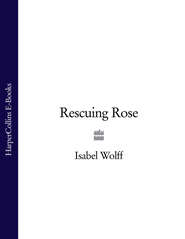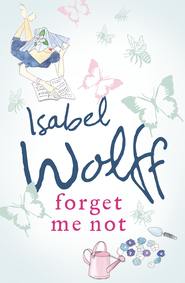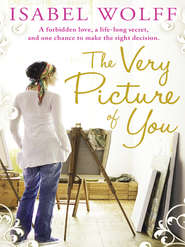По всем вопросам обращайтесь на: info@litportal.ru
(©) 2003-2024.
✖
A Vintage Affair: A page-turning romance full of mystery and secrets from the bestselling author
Автор
Год написания книги
2019
Настройки чтения
Размер шрифта
Высота строк
Поля
Mrs Bell hesitated for a moment, then came back into the room. I heard her sigh. ‘My mother made it for me. It was in February 1943. I was thirteen. She had queued for five hours to buy the fabric and it took her two weeks to make. She was rather proud of it,’ Mrs Bell added as she sat on the bed again.
‘I’m not surprised – it’s beautifully made. But you’ve kept it for … sixty-five years?’ What had motivated her to do so? I wondered – pure sentimentality, because it had been made by her mother?
‘I have kept it for sixty-five years,’ Mrs Bell reiterated quietly. ‘And I will keep it until I die.’
I glanced at it again. ‘It’s in amazing condition – it looks almost unworn.’
‘That’s because it is almost unworn. I told my mother that I had lost it. But I hadn’t – I had only hidden it.’
I looked at her. ‘You hid your winter coat? During the war? But … why?’
Mrs Bell looked out of the window. ‘Because there was someone who needed it far more than I did. I kept it for that person, and I have been keeping it for her ever since.’ She heaved another profound sigh; it seemed to come from her very depths. ‘It’s a story I have never told anyone – not even my husband.’ She glanced at me. ‘But lately I have felt the need to tell it … just to one person. If just one person in this world could hear my story, and tell me that they understand – then I would feel … But now …’ Mrs Bell lifted her hand to her temple, pressed it, then closed her eyes. ‘I am tired.’
‘Of course.’ I stood up. ‘I’ll go.’ I heard the carriage clock chime five thirty. ‘I didn’t mean to stay for so long – I’ve enjoyed talking to you. I’ll just put everything back in the wardrobe.’
I hung up on the left side the clothes that I intended to buy, then I wrote Mrs Bell a cheque for £800. As I gave it to her, she shrugged as though it were of no interest.
‘Thank you for letting me see your things, Mrs Bell.’ I picked up my bag. ‘They’re lovely. I’ll phone you next Monday, to arrange a time for me to collect everything.’ She nodded. ‘And can I do anything for you before I go?’
‘No. Thank you, my dear. But I would be grateful if you could let yourself out.’
‘Of course. So …’ I held out my hand. ‘I’ll see you next week then, Mrs Bell.’
‘Next week,’ she echoed. She looked at me then suddenly clasped my hand in both hers. ‘I already look forward to it – very much.’
FOUR (#u2ead5159-4ca4-58b7-8a61-f5cfd585c4ee)
This morning as I drove to see my seamstress, Val, in unexpected drizzle my mind kept returning to the little blue coat. It was sky blue – the blue of freedom – yet it had been hidden away. As I crawled up Shooter’s Hill Road in nose-to-tail traffic I tried to imagine what the reason might be. Sometimes – and now I remembered my mother’s remark about sartorial archaeology – I can work out a garment’s history from the way it’s been worn. When I was at Sotheby’s, for example, someone brought me three dresses by Mary Quant. They were all in good condition, except that each had a threadbare patch on the right sleeve. The woman who’d brought them in told me that they had belonged to her aunt, a novelist, who wrote all her books in longhand. A pair of Margaret Howell linen trousers with a worn left hip had been owned by a model who’d had three babies in the space of four years. But now, as I flicked on the windscreen wipers, I could come up with no theory for Mrs Bell’s coat. Who, in 1943, had needed it more than she did? And why had Mrs Bell never told anyone the story – not even her adored husband?
I hadn’t mentioned it to Annie when she’d arrived for work this morning. I’d simply said that I’d be buying quite a few things from Mrs Bell.
‘Is that why you’re going to your seamstress?’ she asked as she re-folded the knitwear. ‘To have some of them altered?’
‘No. I’ve got some repairs to collect. Val phoned me last night.’ I picked up my car keys. ‘She doesn’t like things hanging around once they’re done.’
Val, who’d been recommended to me by Pippa at the Moon Daisy Café, is extremely quick and very reasonable. She is also a dressmaking genius and can restore even a wrecked garment to its former glory.
By the time I parked outside her house in Granby Road at the nicer end of Kidbrooke the drizzle had become pelting rain. I peered through the misted windscreen and watched the raindrops bounce off the bonnet like ball bearings. I’d need my umbrella just to get to Val’s porch.
She opened the door – a tape measure slung round her neck – and her pointy little face folded into a smile. Then she noticed my umbrella and looked at it suspiciously. ‘You won’t put that up in here, will you?’
‘Of course not,’ I replied as I lowered it. I gave it a good shake. ‘I know you think it would be…’
‘Unlucky.’ Val shook her head. ‘It would be – especially as it’s black.’
‘Is that worse then?’ I stepped inside.
‘Much worse. And you won’t drop it on the floor, will you?’ she added anxiously.
‘No – but why not?’
‘Because if you drop a brolly it means there’ll be a murder in the house in the near future, and I’d rather avoid it, especially as my husband’s been driving me up the wall lately. I don’t want to…’
‘Push your luck?’ I suggested as I placed the umbrella in her stand.
‘Exactly.’ I followed her down the passage.
Val is short, sharp and thin – like a pin. She is also superstitious to the point of it being a compulsion. It isn’t just that she – by her own admission – salutes solitary magpies left, right and centre, bows to the full moon and strenuously avoids greeting black cats. She has an encyclopaedic knowledge of superstition and folklore. In the four months that I’ve known her I have discovered that it’s unlucky to eat a fish from the tail towards the head, to try and count the stars, or to wear pearls on your wedding day. It’s unlucky to drop your comb while doing your hair – it portends disappointment – or to stick knitting needles through balls of yarn.
On the other hand it’s lucky to find a nail, eat an apple on Christmas Eve, and to accidentally put a garment on inside out.
‘Right then,’ Val said as we went into her sewing room, every surface of which was stacked up with shoe boxes brimming with cotton reels and zips, sewing patterns, cards of ribbon, swatches of fabric and spools of bias binding. She reached under the table and produced a large carrier bag. ‘I think these have come up quite nicely,’ she said as she handed it to me.
I looked inside it. They had. A maxi-length Halston coat with a ripped hemline had been shortened to mid-calf; a fifties cocktail dress with perspiration stains had had the arms cut out so that it was now elegantly sleeveless; and an Yves St Laurent silk jacket, which had been sprayed with champagne, had been speckled with sequins to cover the stains. I’d have to point out these alterations to prospective buyers, but at least the clothes had been saved. They were much too beautiful and good just to be thrown away.
‘They’ve come up brilliantly, Val,’ I said as I reached for my bag to pay her. ‘You’re so clever.’
‘Well, my gran taught me to sew; and she always said that if there’s a fault on a garment then don’t just mend it – make a virtue of it. I can still hear her saying it to me now: “Make a virtue of it, Valerie.” Oh.’ She’d dropped her scissors and was staring at them with a look of insane happiness. ‘That’s great.’
‘What is?’
‘They’ve landed with both points sticking into the floor.’ She stooped to pick them up. ‘That’s really good luck,’ she explained, waving them at me. ‘It usually means that more work’s coming into the household.’
‘It is.’ I told her that I was buying a collection of clothes and that about eight of the garments would need minor repairs.
‘Bring them in,’ Val said as I handed her the money I owed her. ‘Thanking you. Ooh…’ She peered at the coat. ‘That bottom button’s a bit loose – let me do it before you go.’
Suddenly the door bell rang three times in quick succession.
‘Val?’ called a gravelly voice. ‘You there?’
‘That’s my neighbour, Maggie,’ Val explained as she threaded her needle. ‘She always rings three times to let me know it’s her. I leave the door on the latch as we’re forever popping in and out of each other’s houses. We’re in the sewing room, Mags!’
‘Thought you would be! Hiya!’ Maggie was standing in the doorway, almost filling it. She was the physical opposite of Val, being big, blonde and spready. She was wearing tight black leather trousers, gold stilettos, the sides of which struggled to contain her plump feet, and a low-cut red top which displayed a massive, if somewhat crepey, cleavage. She was also wearing tawny-toned foundation, bright blue eye-liner and false lashes. As for her age, she could have been anywhere between thirty-eight and fifty. She exuded the scent of Magie Noire mingled with cigarettes.
‘Hi, Mags,’ said Val. ‘This is Hoebe,’ she added through gritted teeth as she bit the end of the cotton. ‘Phoebe’s just opened a vintage dress shop over in Blackheath – haven’t you, Phoebe. By the way,’ she added to me, ‘I hope you put salt on the doorstep like I told you to. It helps protect against misfortune.’
I’d had so much misfortune it would have made no difference, I reflected. ‘I can’t say I did do that, no.’
Val shrugged as she put a rubber thimble on her middle finger. ‘Don’t say I didn’t warn you.’ She began to re-stitch the button. ‘So how’s it going then, Mags?’
Mags sank into a chair, evidently exhausted. ‘I’ve just had the most difficult client. For ages he refused to get started – he just wanted to talk; then he took forever about it, and afterwards he was tricky about paying because he wanted to pay by cheque and I said it’s cash or nothing, as I had made quite clear beforehand.’ She rearranged her breasts in an indignant manner. ‘When I said I’d call the Bill he produced the notes sharp enough. I couldn’t half do with a cup of something though, Val – I’m all in and it’s only half eleven.’
‘Put the kettle on then,’ said Val.
Mags disappeared into the kitchen, her nicotine rasp carrying down the passageway. ‘Then I had this other customer – he had this weird obsession with his mother – he’d even brought one of her dresses with him. Very demanding, he was. I did what I could for him, but he then had the cheek to say that he was “dissatisfied” with my “services”. Imagine!’
The probable nature of Maggie’s business was by now clear.











